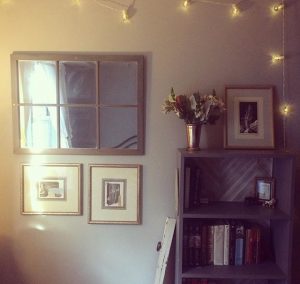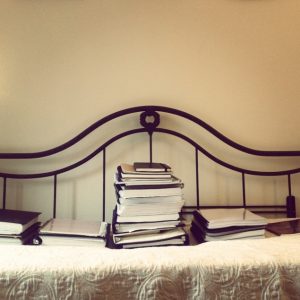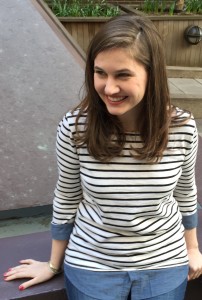I recently watch a documentary on Netflix called “Minimalism.” It’s a concept I’d already heard of—having read Marie Kondo’s The Life Changing Magic of Tidying Up last year. In that book, Kondo advocates a sort of personal minimalism, wherein you only keep possessions that “Spark Joy.” The documentary, “Minimalism” follows Joshua Fields Millburn and Ryan Nicodemus, two best friends who advocate for a similar lifestyle. Their memoir is called Everything that Remains. The idea is that minimalism isn’t so much about what you throw away as what you decide to keep. They both claim, in separate ways, that filling your house only with what is essential, useful and valuable, what, in Kondo’s words “sparks joy,” can free your mind and your life.
Marie Kondo and the Minimalists don’t advocate for the exact same method, and both stress that different individuals will approach minimalism differently, but they’ve both created a large following of dedicated “minimalists.” I think the concept is resonating with people because our lives are so cluttered. Our houses are full. Our minds never stop. We’re constantly an iPhone click away from the world of online shopping, social media, and politics. The idea of de-cluttering your house—and that leading to de-cluttering your mind and life, allowing you to live with more purpose—is an intriguing one.
Minimalism for Writers
So what does this have to do with writing? Well, I don’t know about you, but I have a hard time un-cluttering my bookshelf, much less my apartment, my mind or my life. Like most writers, I have a full time job in addition to personal commitments. My life is anything but uncluttered, and my schedule is as crowded as my apartment.
Finding the time to write is difficult enough. But I also often don’t have the space and quiet and focus to write well. I write in small pockets, and generally amid a certain amount of chaos. On the train. In a café. At an apartment with roommates watching TV ten feet away. To a certain extent, this is inescapable. We are surrounded by people and things, jockeying for our time and concentration.
This is exactly why the idea of minimalism is so appealing to me as a writer. Are there ways that I can carve out a quiet, uncluttered space for writing? And how might my writing and mindset change if I did?
Trying it Out
 When I read Kondo’s book last year, I began to see how the benefits of minimalism may be particularly useful for writers. I saw the potential, and started my own process of “tidying up.” In a recent Instagram post, Kondo wrote: “When readers initially complete the book, many only partially tidy because they are skeptical about the Method or they never get around to completely tidying.”
When I read Kondo’s book last year, I began to see how the benefits of minimalism may be particularly useful for writers. I saw the potential, and started my own process of “tidying up.” In a recent Instagram post, Kondo wrote: “When readers initially complete the book, many only partially tidy because they are skeptical about the Method or they never get around to completely tidying.”
That ended up being me. But, I did throw away or donate a lot of stuff, and began to see how minimalism could really work. I even chucked my desk. What? Yes. I threw away my desk. After going through my entire closet and getting rid of clothes that didn’t “spark joy,” I looked at that old thing—part of a furniture set that was now long gone, with three of its seven drawers not even working, and decided it didn’t spark joy. In fact, it did the opposite. It served the function of giving me somewhere to write, but was a daily source of frustration, and took up a huge chunk of space in my tiny bedroom. So, I donated it. I set up a writing spot in my kitchen, under the bright sunlight of a window, and decided I’d find a desk that brought me real joy.
I didn’t miss that desk. I enjoyed the extra space, and the feeling of walking into a light, airy room. I enjoyed knowing all of my clothes were in my closet—yes, even seasonal ones—because I’d pared down my wardrobe to stuff I actually wore. I even donated two whole boxes of books (not that this made a massive dent). Because I’d done a lot of what I already deemed drastic, I thought I’d officially “Tidied.”
Minimalism Fail
 One of the biggest benefits of minimalism, that both Kondo and the Minimalists talk about, is that getting rid of stuff frees you up to live in the present. For example, Kondo discusses how you don’t need papers from a class you took three years ago. You have the knowledge in your head. The papers just take up space, a relic of who you were, not the person you are or are becoming. Same with the majority of mementos. In one haunting scene in Everything That Remains, the authors describe Joshua going through his mom’s apartment after her death. She had boxes and boxes of schoolwork from Joshua’s childhood. Untouched. Gathering dust. And for what purpose? She had the real, live Joshua right there. What was the point of keeping papers from when he was seven? Papers no one even looked at?
One of the biggest benefits of minimalism, that both Kondo and the Minimalists talk about, is that getting rid of stuff frees you up to live in the present. For example, Kondo discusses how you don’t need papers from a class you took three years ago. You have the knowledge in your head. The papers just take up space, a relic of who you were, not the person you are or are becoming. Same with the majority of mementos. In one haunting scene in Everything That Remains, the authors describe Joshua going through his mom’s apartment after her death. She had boxes and boxes of schoolwork from Joshua’s childhood. Untouched. Gathering dust. And for what purpose? She had the real, live Joshua right there. What was the point of keeping papers from when he was seven? Papers no one even looked at?
 This was the part in the de-cluttering process where I got stuck and quit, and I imagine it’s a problem that would particularly effect writers. With five manuscripts in my rear-view, I’ve accumulated a lot of old drafts. I used to have them in boxes under my bed. But, in keeping with Kondo’s method, I pulled those boxes out, and I put all the drafts on one of my bookshelves. It really looks quite unattractive. They’re organized. But they’re in the past. Books I won’t be re-writing again. I asked myself, Do I really need them? Especially given that I have the files on my computer? But then, those files were also a cluttered mess, and I didn’t really like delving into them. The decision felt too big, so I left them on my shelf, let a few more piles accumulate, and didn’t think about it again until I watched the Minimalist’s Documentary and read their memoir almost a year later.
This was the part in the de-cluttering process where I got stuck and quit, and I imagine it’s a problem that would particularly effect writers. With five manuscripts in my rear-view, I’ve accumulated a lot of old drafts. I used to have them in boxes under my bed. But, in keeping with Kondo’s method, I pulled those boxes out, and I put all the drafts on one of my bookshelves. It really looks quite unattractive. They’re organized. But they’re in the past. Books I won’t be re-writing again. I asked myself, Do I really need them? Especially given that I have the files on my computer? But then, those files were also a cluttered mess, and I didn’t really like delving into them. The decision felt too big, so I left them on my shelf, let a few more piles accumulate, and didn’t think about it again until I watched the Minimalist’s Documentary and read their memoir almost a year later.
Digital Clutter
One area that neither Kondo nor the Minimalists discussed (disclaimer: I haven’t read everything they’ve written) is the idea of digital minimalism. Of clearing the clutter on our computers. Perhaps I’m acutely aware of this because I have fifteen million drafts of each of my books on my computer. I think most writers probably do. And the idea of un-cluttering this particular tool is particularly daunting. But, having seen the benefits of de-cluttering my physical space even half-way, I think de-cluttering my digital ones as well could be hugely beneficial. It would allow me to put old work behind me, knowing I’ve gained knowledge from what I’ve already written, but perhaps don’t need to hold onto it. Also, having an organized file of all my manuscripts and drafts would give me more peace of mind with throwing away the physical ones. I think it will give me more peace of mind period.
Yesterday, I cleaned off my desktop, deleting or cataloguing every file except the Scrivener manuscript I’m currently working on, and replacing my background with a simple, clean and light image. I also emptied out all my inboxes, and disconnected all of them from my Start menu. I was surprised by how much peace and focus even just these small acts brought me. And I wondered how much more de-stressed, peaceful and focused I’d feel if I knew that I didn’t have piles of unorganized files in tons of folders throughout my hard drive. If I didn’t have a giant archive of emails, but only kept important ones. Would my computer feel more like a productive writing tool and less like a dumping ground? What might that do for my (admittedly still limited) writing time? Could I focus better with less to focus on?
The Experiment
Over the next month, I’ll be putting this question into practice, de-cluttering everything from my nightstand to my email inbox. The idea is to push “delete” more than “archive.” To let go of things from the past—yes, even manuscripts—and free up my working spaces, both physical and digital, for creation, rather than storage. At DIY MFA, we’re all about iteration. This is a concept I think is worth giving a try.
In my next article, I’ll share the results. If I find the process are helpful as I expect, I’ll also go deeper into my methods. Virginia Woolfe said a female writer needs, “A room of one’s own.” I think this is true of all writers, both male and female. We need space to create. And I might add that we ought to think quite carefully about what we allow to accumulate in that space.
Interested in keeping up with my minimalism experiment? Check back for my next article, or follow along on social media. I’ll be using the hashtag #WriterMinimalism








